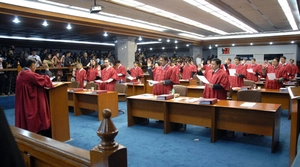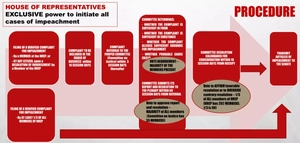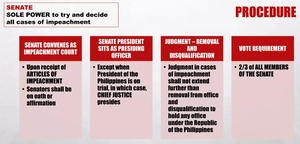


Impeachment in the Philippines Process slides by Ret. Justice Antonio Eduardo B. Nachura
Advertisement:


Impeachment Proceedings in the Philippines: A Comprehensive Guide for Filipinos 🇵🇭⚖️
Table of Contents
Ever wondered how impeachment works in the Philippines?
🤔 From filing charges to the Senate trial, this comprehensive guide breaks down the process, its purpose, and its significance for every Filipino.
Get informed and be empowered! ✨
Impeachment proceedings are a crucial mechanism in the Philippines’ system of checks and balances, designed to hold high-ranking government officials accountable for grave misconduct. It’s a powerful tool, but the process can be complex and confusing.
This guide aims to provide clarity, explaining impeachment in the Philippines in a way that’s easy to understand, emphasizing its importance for every Filipino citizen.
Understanding impeachment proceedings is vital for civic engagement.
Why Do We Have Impeachment Proceedings in the Philippines? (The Purpose)
Imagine a high-ranking official abusing their power – perhaps through corruption, violating the Constitution, or betraying the nation. Impeachment acts as a safeguard, a way to remove them from office and protect our democracy.
It’s not about punishing minor infractions, but about addressing serious offenses that erode public trust and threaten the rule of law.
These impeachment proceedings serve as a deterrent against abuse of power.
Impeachment in the Philippines is specifically for:
- Treason: Betraying the Philippines, such as by aiding its enemies during wartime.
- Bribery: Accepting or soliciting money or gifts to influence official decisions.
- Graft and Corruption: Misusing public funds or positions for personal gain.
- Other High Crimes: Grave offenses against the Constitution and laws of the Philippines, as determined by the House of Representatives.
How Do Impeachment Proceedings Work in the Philippines? (The Process)
The 1987 Philippine Constitution outlines the impeachment process. It’s a two-stage procedure:
- Impeachment (Filing of Charges):
- A verified impeachment complaint is filed by at least one-third (1/3) of all the Members of the House of Representatives.
- The House Committee on Justice reviews the complaint for sufficiency in form and substance.
- If deemed sufficient, the House of Representatives votes on whether to impeach the official. A simple majority vote of all the Members of the House is required for impeachment.
- Trial:
- If the House impeaches the official, the case moves to the Senate, which acts as an Impeachment Court.
- The Senate conducts a trial, where evidence is presented by both the prosecution (represented by the House of Representatives) and the defense. Witnesses can be called and cross-examined.
- A two-thirds (2/3) vote of all the Senators present is needed to convict the official and remove them from office.
Who Can Face Impeachment Proceedings in the Philippines?
Impeachment isn’t exclusively for the President. In the Philippines, the following officials are subject to impeachment proceedings:
- The President
- The Vice-President
- The Justices of the Supreme Court
- The Members of the Constitutional Commissions (COMELEC, COA, CSC)
- The Ombudsman
What Happens After Impeachment Proceedings?
If the Senate convicts an impeached official, they are immediately removed from their position and disqualified from holding any public office in the future.
Importantly, impeachment proceedings do not preclude criminal prosecution in a regular court for the same offenses.
Impeachment Proceedings: Politics and Justice
Impeachment is a political process, influenced by the political climate and the composition of the House and Senate. This can be both an advantage and a disadvantage.
It’s vital for Filipinos to be informed and vigilant, ensuring that impeachment proceedings are used responsibly, to uphold accountability, and not for political vendettas or partisan gains.
Frequently Asked Questions (FAQ)
Can a private citizen file an impeachment complaint?
No. Only at least one-third of all the Members of the House of Representatives can file a verified impeachment complaint.
What’s the difference between impeachment and a criminal case?
Impeachment is about removing someone from office for grave misconduct. A criminal case seeks to determine guilt or innocence of a crime. They are distinct legal processes.
Has a Philippine President ever been removed through impeachment proceedings?
No Philippine President has been successfully impeached and removed from office through a Senate trial. Several impeachment complaints have been filed, but none have resulted in a conviction.
Disclaimer
Pinoy Trending informs that this article provides general information about impeachment proceedings in the Philippines. It is not legal advice and should not be used as a substitute for consulting with a qualified legal professional.
The information provided is based on the 1987 Philippine Constitution and related laws, which are subject to interpretation and amendments. It is crucial to consult official government sources, like the House of Representatives and the Senate, for the most accurate and up-to-date information on impeachment proceedings.
References
- 1987 Constitution of the Republic of the Philippines
- Rules of the House of Representatives
- Rules of the Senate acting as an Impeachment Court
Conclusion
Impeachment proceedings are a vital mechanism for ensuring accountability and preserving the integrity of public office in the Philippines. Understanding the process, its purpose, and its limitations is crucial for every Filipino citizen.
By staying informed and engaged, we can help ensure that this powerful tool is used responsibly and effectively to safeguard our democracy. It’s our responsibility to be informed about impeachment proceedings. 🇵🇭
Josh is a seasoned content writer and journalist with over 15 years of experience creating impactful, accurate, and engaging content across industries like technology, healthcare, finance, and media. He specializes in translating complex topics into clear, accessible narratives and excels in technical documentation, editorial writing, and marketing materials.
A skilled journalist, Josh delivers in-depth features and articles that resonate with readers. Known for his attention to detail, research skills, and reliability, he is dedicated to producing high-quality content that informs, educates, and inspires.


